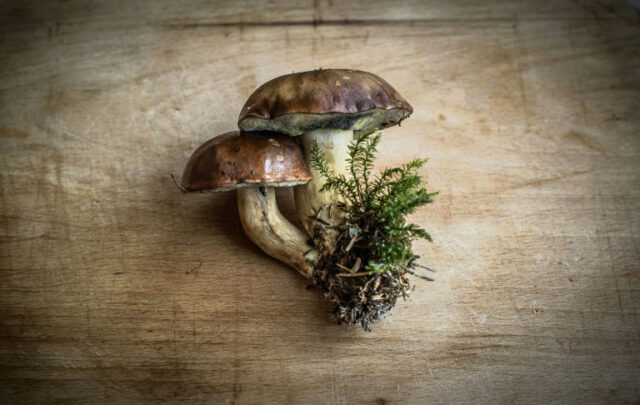
Nourishing Traditions: The Cookbook that challenges Politically Correct Nutrition and the Diet Dictocrat by Sally Fallon with Mary G. Enig, New Trends Publishing, 674pp, $27.00.
With July Fourth coming up, you can expect to hear lots of discussion on the left and in the green community about how bad “independence” really is — no matter how cool you may think the Founding Fathers were.
Instead of good old American values like independence, self-reliance and individualism, well meaning folks are sure to tell us that we should be embracing interdependence, cooperation and community.
All well and good. Everybody from quantum physicists to Tibetan lamas to permaculture teachers and mushroom hunters will explain how physical reality is actually just a web of relationships rather than the collection of separate beings visible to our flawed human perception. So who am I to argue?
At the same time, I’m not ready to throw the Jeffersonian baby out with the jingoistic bathwater.
On a deep philosophical level, maybe the biggest problem of industrial people is that we are too self-centered and narcissistic to put aside our petty concerns about getting and spending to start working together on things like saving the rainforest and fighting climate change.
But maybe the other side of the coin is that too many of us have become compliant sheeple who can’t or won’t think and act for ourselves.
We are not the pioneers of the Oregon Trail. We are customers of Amazon.com.
And we can’t seem to boil an egg these days without help from some big corporation.
Of course, Cargill, Kraft and Safeway provide our food. Exxon and Honda provide our transportation. Nike and Walmart provide our clothes. Comcast and MSNBC and Google provide our information and entertainment (if you can still tell the difference between the two). And on and on it goes.
It seems to me then, that modern people are already plenty dependent, whatever lies we may tell ourselves about how masterful our machines have made us. It’s just that today we’re dependent on the wrong people — not our families and our neighbors as in the past, but Wall Street investors and corporate CEOs. And the problem is, as the banking and mortgage collapse of 2008 showed, those folks mean us no good.
And that’s why I think that this July we don’t need less independence. What we really need is more independence.
What better place to start than with food, that most intimate and tangible of human needs that has been so adulterated, degraded and mutilated by big corporations?
Food companies claim to be acting in our best interests. But it’s become pretty clear after pink slime that they’re just taking us for a ride.
Down with the diet dictocrats
Sally Fallon knows something about fighting for food freedom against the twin forces of big corporations and a health establishment that’s wedded to low-fat dieting.
Fallon runs the Weston A. Price Foundation, a group dedicated to helping people enjoy better health by embracing the raw and unprocessed foods of the pre-industrial era. Forget margarine, it’s all about lard. And if you want to take away his raw milk from a Price follower, you’ll have to pry the bottle out of his cold dead fingers.
Fallon also runs a legal defense fund to keep raw milk dairies and local family farms that sell directly to consumers out of hot water.
But Fallon is perhaps best known for helping thousands of families declare their independence from corporate food by publishing Nourishing Traditions: The Cookbook that challenges Politically Correct Nutrition and the Diet Dictocrats.
After reading Dr. Price’s fascinating account of his Indiana Jones-style travels around the world* in the 1930s to find indigenous peoples with healthy diets, I became curious about how my family could apply Price’s findings in my own life. So my wife and I started following some of his prescriptions — especially taking cod liver oil (you do kind of get used to the taste) and eating butter that she makes at home from our weekly raw milkshare delivery.
Fallon’s cookbook, first released in 1999, is the natural place to go for recipes with the Price seal of approval. But today, with food chemicals and GMOs, the stakes are even higher than they were in Price’s day when the biggest threat to human nutrition came from the refined foods of the Depression that may seem relatively harmless by today’s standards — mostly white flour and sugar.
Those are still villains in Fallon’s food drama, but she finds so much more in the processed food of today to worry about: high fructose corn syrup, MSG, trans fats and of course the bugaboo of food freedom activists, pasteurized milk. The latter Fallon finds so objectionable — not just lacking in nutritional value but positively harmful — she recommends that, if you can’t get it raw, you don’t drink milk at all.
The raw and the cooked
As my wife and I discovered when we tried a couple of Fallon’s recipes, they may require a change of perspective. You need to think of food as more than just calories to put in your mouth. You need to think of food as medicine.
So, if you haven’t decided on dinner yet but the kids are coming home in half an hour and you need to pick up something quick to throw in the microwave, then this isn’t the cookbook for you.
But if you want your food to make you healthier in the long run instead of wearing you down over the years, and if you’re willing to see cooking as a bit of an adventure, then the advance planning that many of Fallon’s recipes require will be well worth the trouble.
Here are a few points on why Fallon’s approach may be more work than you’re used to and also why that might be worthwhile:
Leave it out for a few days
Before refrigeration and factory food processing, much of the food people ate in the past might today be considered spoiled. But Fallon calls it cultured or fermented and finds it to be ultra-healthy. Consider it a form of pre-cooking — that makes food more edible for humans — that our microbe friends do for us without any expense or effort on our part.
If you’re going to make your own cheese or pickles, you may have to wait a few days or more before they’re ready to eat. But cultured and fermented foods are beloved of traditional peoples and prized by Fallon because they’re easier to digest, in some cases, converting harmful foods that may contain carcinogens and chemicals that actually deplete the body’s stores of calcium and other minerals (such as raw soybeans) into powerful health foods (such as miso).
That’s why Fallon starts with recipes for cultured dairy products, from butter and buttermilk to creme fraiche and kefir.
Nourishing Traditions Kimchee
I’m a big fan of kimchee, Korean picked cabbage, because I love crunchy, salty and vinegary vegetables. Kimchee tastes great and it’s also probiotic and fantastic for digestion. Fallon’s recipe is simple:
- 1 large head napa cabbage (the type of cabbage is important to get the traditional look of kimchi)
- 1 bunch of spring/green onions
- 1/2 cup grated carrots (optional)
- 1/2 cup daikon radish grated
- 1 Tablespoon minced garlic
- 1 Tablespoon freshly grated ginger
- 4 Tablespoons whey
- 1 Tablespoon sea salt (add only 2 teaspoons if you use the fish sauce)
- 1 Tablespoon non-MSG added fermented fish sauce (there’s a recipe in NTthat I haven’t made yet, or you can purchase a bottle)
- 1/4 cup of Kochukaru (Korean chili pepper powder – look for this in your Asian market) —- OR —- 1/2 teaspoon dried chile flakes (red pepper flakes)
Make your own condiments
Because store-bought ketchup or mayonnaise might contain nasty stuff like corn syrup, sugar or MSG (a proven neurotoxin), Fallon recommends making your own.
Is it worth it? Real condiments don’t just have vinegar mixed in for flavor — they often get their taste through fermentation, which makes them probiotic just like all those cultured and fermented foods that are so nutritious.
Indeed, folks in the old days were smart enough to know that a steak doesn’t just taste better with a barbecue sauce but that the sauce helps make the steak more digestible and thus, more nutritious.
“Ketchup,” which Fallon explains originally came from southeast Asia, “provides us with an excellent example of a condiment that was formerly fermented and therefore health promoting, but whose benefits were lost with large scale canning methods and a reliance on sugar rather than lactic acid as a preservative.”
Fallon will show you to make not only your own ketchup and mayonnaise, but also tartar sauce, salsa and even fermented fish sauce (Pad Thai, anyone?).
When Fallon talked about how traditional Chinese cooking uses condiments to make meat dishes healthier, it seemed like a good excuse to polish off a bottle of spicy black bean sauce that’s been sitting in our fridge since the end of the George W. Bush Administration. But the label said it’s got MSG, which means I should take a pass. Fortunately, Fallon’s got a recipe to make fermented black bean paste at home.
Fallon also tells you how to make your own salad dressings and sauces, both of which add taste but also help digest the foods they dress. For example, check out the Nourishing Cook for a walk-through of how to make Fallon’s recipe for pesto.
Eat meat and be careful with grains
Like many who offer paleo or low-carb diets, Fallon believes in the power of protein, especially from animals. And if you have any inclination at all to skip meat, eggs or dairy, Fallon counsels against it, saying you’ll just be undernourished no matter how well fed. That’s sure not to win any friends among the low-fat nutritional establishment, not to mention vegetarians and vegans.
Talk about politically incorrect — Fallon even stands up for cholesterol:
High serum cholesterol levels often indicate that the body needs cholesterol to protect itself from high levels of altered, free radical-containing fats. Just as a large police force is needed in a locality where crime occurs frequently, so cholesterol is needed in a poorly nourished body to protect the individual from a tendency to heart disease and cancer. Blaming coronary heart disease on cholesterol is like blaming the police for murder and theft in a high crime area.
But in contrast to many paleo diets, grains are not verboten for Fallon as long as you prepare them correctly before cooking to neutralize the phytic acid and enzyme inhibitors found in raw grains that can interfere with digestion. Sprouting, overnight soaking and sour leavening should do the trick. Using prepared wheat and lesser-known grains like spelt and kamut, Fallon offers recipes for pancakes, waffles, crepes and biscuits that won’t pack on the pounds.
You already know it’s extra effort to forgo mac and cheese in a box, even if it’s Annie’s Organic, and instead, make your own pasta from sprouted whole wheat flour and melt your own homemade cheddar on top — of course, not using the microwave.
But if you’re going to take the trouble to make your own ketchup, then you’ve really got to believe that eating better than the industrial average will make you healthier than the average person today, wracked as most of us are with the many chronic ailments of modern life from hypertension and diabetes to heart disease and cancer.
As you improve your own health and that of your family, at the same time you can re-learn old-timey cooking and food preservation skills that will make you feel empowered and self-reliant. This kind of re-skilling is a cornerstone of peak oil prep and the Transition movement.
Then, if you buy raw and fresh ingredients directly from family producers at the farmers market or a local farmstand, you can withdraw your food spending from industrial food conglomerates, a neat form of boycotting something bad while encouraging something much better.
Finally, if you learn how to turn a stripped chicken carcass into a bone stock (which Price found to be uniquely healing) rather than throwing the bones out then you can become a powerful ecological steward, diverting waste from the landfill and honoring nature’s precious creation.
It then seems pretty clear to me how declaring independence from industrial food will affirm our interdependence with the good earth from which we are made and to which we will someday all return.
In that, might cooking and eating natural food, as free as possible of industrial taint, become a spiritual practice of connectedness as much as a moral imperative for the age of climate change and peak oil?
– Erik Curren, Transition Voice






